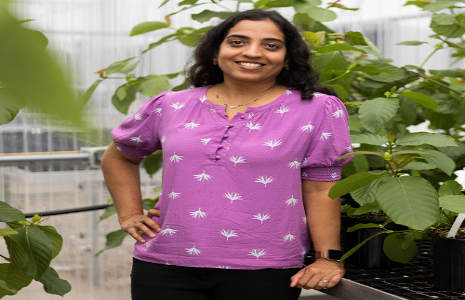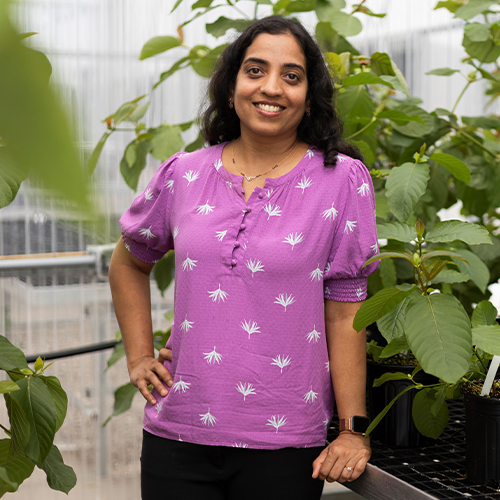Dr. Satya Swathi Nadakuduti
Assistant Professor / Plant Biotechnology and Biochemistry - Medicinal and Therapeutic Plants

Dr. Satya Swathi Nadakuduti is an Assistant Professor in the Department of Environmental Horticulture at the University of Florida. Dr. Nadakuduti received her Ph.D. in Plant Breeding, Genetics and Biotechnology from Michigan State University. Her lab is interested in studying plants specialized metabolism in order to understand the chemical diversity, identify compounds that have pharmaceutical value, their potential for health benefits and applications in agriculture. Her research program integrates multi-disciplinary approaches such as biochemistry, genomics, gene discovery and functional characterization to understand the molecular mechanisms underlying the biosynthesis of these compounds. Her group is also interested in targeted genome modifications using gene-editing technology such as CRISPR/Cas9 for agriculture crop improvement, as functional genomics tool and to understand genome-wide off-target affects caused by gene-editing reagents. Her group is interested in micropropagation and implementing gene-editing in medicinally relevant plant species.
Dr. Satya Swathi Nadakuduti CV
-
RESEARCH
Plant biochemistry, genetics and biotechnology lab
Plant specialized metabolism
Our planet Earth is home to estimated 350,000 plant species. There is enormous chemical diversity in these plant species, which mainly comes from specialized metabolites selected throughout the course of evolution to address special needs. Plant specialized metabolism has been harnessed for various purposes including food/agriculture, traditional and modern medicine out of many others. My lab is interested in the discovery of plant specialized metabolites that have pharmaceutical value by exploring medicinally relevant plant species that have potential for health benefits and apt for Florida growing conditions. By employing multi-disciplinary approaches such as mass spectrometry, RNA-seq, gene discovery and functional genomics, my lab is interested to understand the chemical diversity of medicinal compounds and molecular mechanisms underlying their biosynthesis with a long-term goal of metabolic engineering and production by expression in heterologous systems.
Gene-editing
Gene-editing offers the ability to generate transgene-free plants. Recently streamlined regulatory processes by the USDA opened up new opportunities for scientists to develop improved crops and useful agricultural products. My lab plans to apply genome-editing to applications in agriculture with the aim of developing valuable gene-edited products and as functional genomics tool to advance discoveries in plant biology. There are no studies to date that characterize genome-editing reagents’ specificity in plants. Work has been initiated towards detecting genome-wide variability (or off-target effects) caused by CRISPR/Cas9, Cas12a, HypaCas9, base editors and TALENs in vegetatively propagated potato (Solanum tuberosum) and seed propagated Camelina sativa, an alternative oilseed crop by targeting economically important traits. My lab is also interested in exploring micropropagation and gene-editing prospects in medicinal plants.
-
EDUCATION
- Ph.D. Plant Breeding, Genetics and Biotechnology - Michigan State University, US 2014
- M.Sc. Plant Breeding and Genetics - Leibniz Universität Hannover, Germany 2007.
- B.Sc. Horticulture - Acharya N. G. Ranga Agricultural University, Hyderabad, India 2005
- PUBLICATIONS

